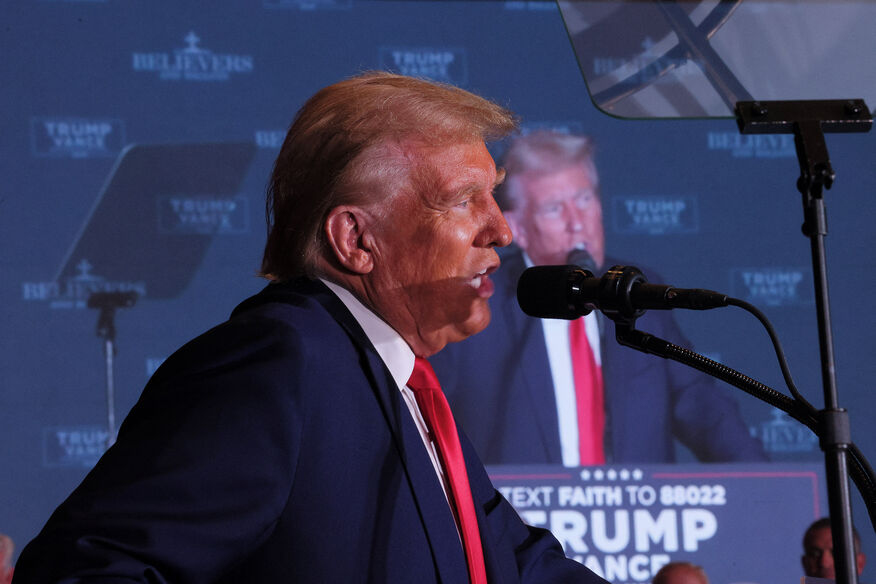[Reuters Breakingviews] Donald Trump is weaker than he looks

By Hugo Dixon
LONDON, Sept 1 (Reuters Breakingviews) - It is easy to fall into the trap of thinking that Donald Trump is all-powerful. The U.S. president has embarked on so many fights, and won quite a few of them, that it may seem like resistance is futile.
For example, Trump has largely got his way with the likes of the European Union and Intel INTC.O. He forced the U.S.’s largest trading partner to agree a one-sided trade deal and the chipmaker to accept the government as a 9.9% shareholder.
But this is only part of the story. While Trump has made headway against weak entities since he took office for a second term in January, he has not had that much success against stronger opponents. A U.S. appeals court, meanwhile, ruled on Friday that most of Donald Trump's tariffs are illegal, though the Supreme Court will probably have the final say.
The EU falls into the first, weaker, category. Its security will be at risk if the U.S. abandons Ukraine. Trump has exploited this fact first to get EU member states to promise to roughly double their defence spending. He used it again to secure a deal in which the trading bloc said that by 2028 it would buy $750 billion of U.S. energy, and that it expects its companies to invest $600 billion in the U.S. by 2028.
But the U.S. administration has not bent China, Russia or India to its will. These are tougher nuts to crack.
Beijing’s control of critical materials seems to have led Trump to think twice before hiking tariffs on Chinese imports. He has also largely held off tightening sanctions on Russia for refusing to agree a ceasefire in Ukraine. The U.S. president has also so far failed to get New Delhi to stop buying Moscow’s oil despite imposing punitive tariffs last week.
Trump has not yet broken the Federal Reserve either. Lisa Cook, the governor he attempted to sack, is fighting back in the courts. Chair Jerome Powell, despite signalling an openness to looser policy, has refused to be browbeaten by Trump.
The White House may ultimately succeed in its campaign to curb the Fed’s independence. But the battle is far from over. Meanwhile, Trump’s popularity is waning and that could hamper his ability to win this and other fights.
POWER AUDIT
Power is essentially the ability to get others to do things against their will. The ability to cause havoc, something Trump does a lot, does not amount to power. A bull in a china shop has a big impact, but not power.
If one does an audit of what Trump has so far intentionally achieved, top of the list is probably his so-called big, beautiful bill. He brushed aside opposition to push through this tax-cutting legislation. Elsewhere, the record is somewhat mixed.
Take trade. The White House has forced through one-sided deals with Japan, the United Kingdom, the EU, Vietnam, Indonesia and others – and may be making progress with Canada and Mexico. But it has failed to do the same across the board – notably with China and India. What is more, the EU is so far resisting pressure to change some rules Trump has branded unfair, such as its digital services regulations.
Similarly, the U.S. president has yet to fully bring Harvard University to heel, though he has succeeded with a few weaker institutions such as Columbia University. Trump’s crackdown on immigration is also somewhat mixed. His hard-nosed tactics have doubled the number of immigrants arrested compared to the past decade. But some such as Mahmoud Khalil, a pro-Palestinian activist, have successfully secured their freedom.
In the most high-profile case, the administration also brought back Kilmar Abrego, whom it illegally deported to El Salvador, after the Supreme Court ordered it to facilitate his return. Though it subsequently arrested him again and is threatening to deport him to Uganda, the courts have so far stopped that.
BACKLASH RISK
Trump’s battles may also make him weaker. A big risk to the United States’ long-term power is how his simultaneous entanglements with so many countries, such as India and Brazil, may drive them closer to China and Russia. If so, Beijing and Moscow will be the big winners from the U.S. president’s bullying.
Meanwhile, the EU resents being bossed around. It may seek to cut its dependence on the United States in the coming years. If so, the U.S. may not be able to count on it as an ally when it needs help – for example, in some future conflict with China.
Some of Trump’s victories could also have a sting in the tail. For example, immigration was once one of his most popular policies. But most Americans now disapprove of what he is doing, according to Reuters/Ipsos polling. Similarly, the U.S. president’s decision to send the National Guard to police Washington, DC is unpopular.
Even more risky is his “big, beautiful bill”, which involves benefit cuts for ordinary people as well as tax cuts for the rich. That is unpopular, according to polling by the Pew Research Center.
Equally, Trump’s victory in jacking up tariffs on imports may push up prices and knock employment. So far, the negative impact is mild. But only 37% of Americans approve of his handling of the economy, according to Reuters/Ipsos polling, something that was his strong suit during his first term in the White House.
The dollar and U.S. bonds, which sold off when Trump launched his trade war in April, have calmed down. So they are not currently providing a brake on his actions. But further measures to strong-arm the Fed or interfere with economic statistics could still cause market trouble.
Probably the biggest constraint on Trump’s power is voters. His approval rating has kept falling since he entered the White House and now stands at 40%. The implication of betting markets is that Trump’s Republican Party will lose control of the House of Representatives in next November’s midterm elections. If so, Trump’s power may be nearing its peak – or may even have passed it.
Follow @Hugodixon on X
Tracking approval of how the president handles the economy

Tracking presidential job approval









